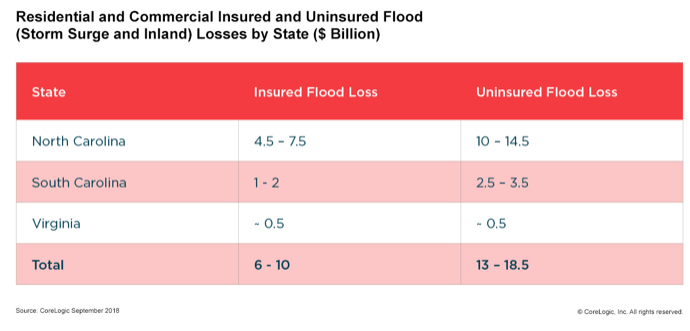In the aftermath of Hurricane Florence, a new problem is surfacing: The shrinking number of households that have flood insurance.
Flood damage is not included in a standard homeowners’ insurance policy. So if a mortgage lender does not require a borrower to obtain it, the onus falls on the homeowner to seek it out. For some, the extra money to do so may make this unlikely. As of April 2017, the average annual premium for a policy through the National Flood Insurance Program was $878.
Fewer than 10 percent of households in North Carolina had federal flood insurance, according to estimates from Milliman, an actuarial firm. An estimated $20 billion to $30 billion in losses occurred due to flood and wind damage from Hurricane Florence’s wrath on the Carolinas last week, according to CoreLogic, a real estate data firm. Insured loss covered by the NFIP is estimated to be just a fraction of that—between $2 billion and $5 billion. About 85 percent of the residential loss is uninsured, according to the report.
The number of policies purchased through the National Flood Insurance Program has dropped over the past decade, according to a report from the Urban Institute. The total is now just over 5 million. So as flood risks heighten, that leaves a lot of homeowners at risk.
Forty-three percent of homeowners wrongly assume damage from heavy rain flooding is covered under their standard insurance policy, according to the 2016 Consumer Insurance Survey, conducted by the Insurance Information Institute.
But in reality, special circumstances are required to get a standard insurance policy to kick in for such damage. For example, if hurricane-force winds caused roof damage that then leads to water damage within the home, insurance will most likely cover repairs. However, if a nearby river crests due to heavy rainfall and causes the flooding, a standard policy will likely not cover the damage. This recent article in MarketWatch notes that many other natural disasters are covered by homeowners’ insurance—wildfires, tornadoes, and hailstorms—yet not floods.
The NFIP has been struggling to pay off claims over the past few years and has faced several lapses or near-expirations as Congress assesses how to continue funding it. Private flood insurance only accounts for about 15 percent of all flood premiums nationwide, with the NFIP providing the remainder. The National Association of REALTORS® has renewed its call for a strengthened NFIP, along with a robust private market. The NFIP is currently authorized until Nov. 30.
“The National Association of REALTORS® remains focused on ensuring Congress and the White House enact long-term reauthorization and reforms to strengthen the program’s sustainability,” NAR President Elizabeth Mendenhall said in a statement. “Flooding is the most common disaster in the United States, one that affects Americans in communities both coastal and inland every year.”
Source:
“Home Insurance Covers Damage From a Volcano, But Not a Flood,” MarketWatch (Sept. 24, 2018) and “Many Enlist, But Flood Coverage Still Falls Short,” Mortgage News Daily (Sept. 21, 2018)













